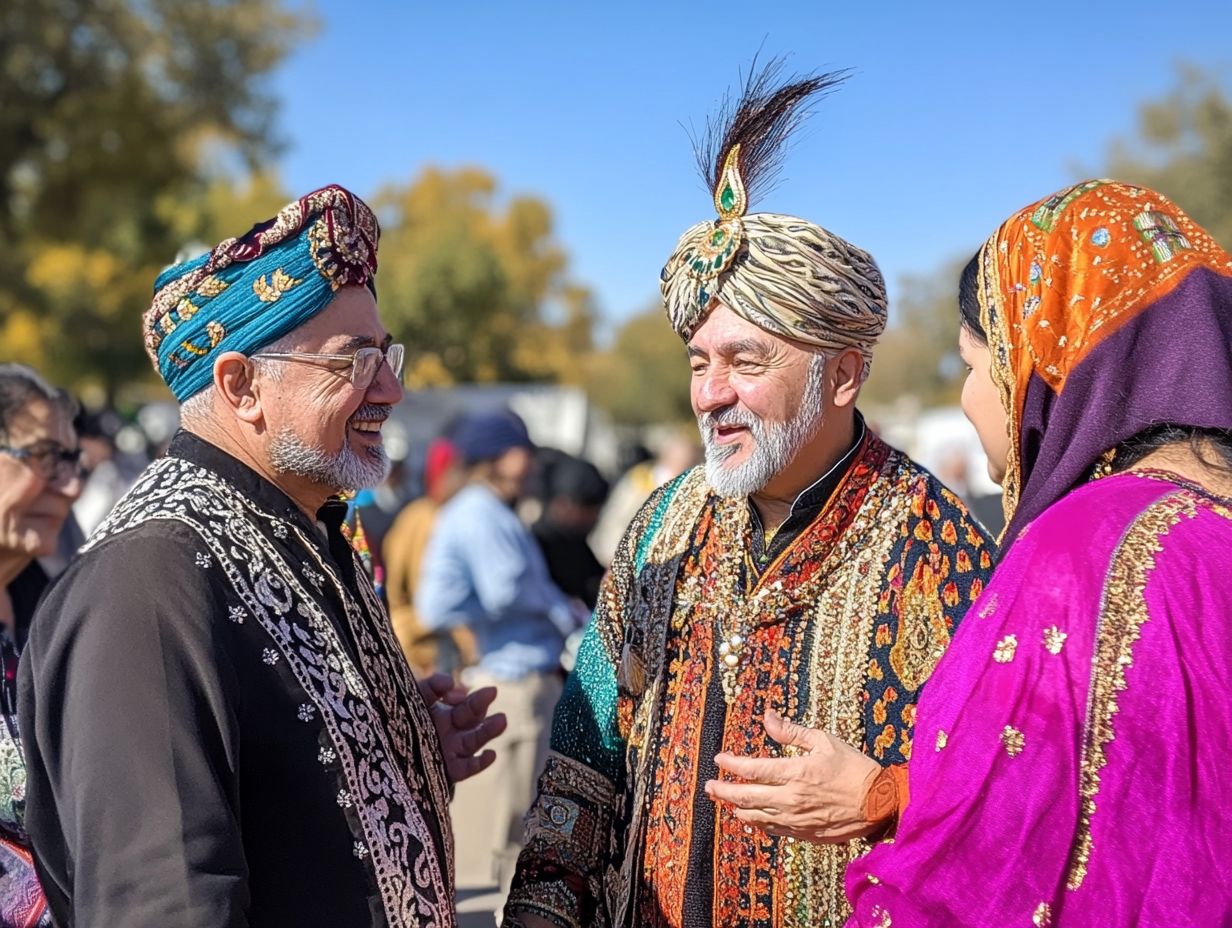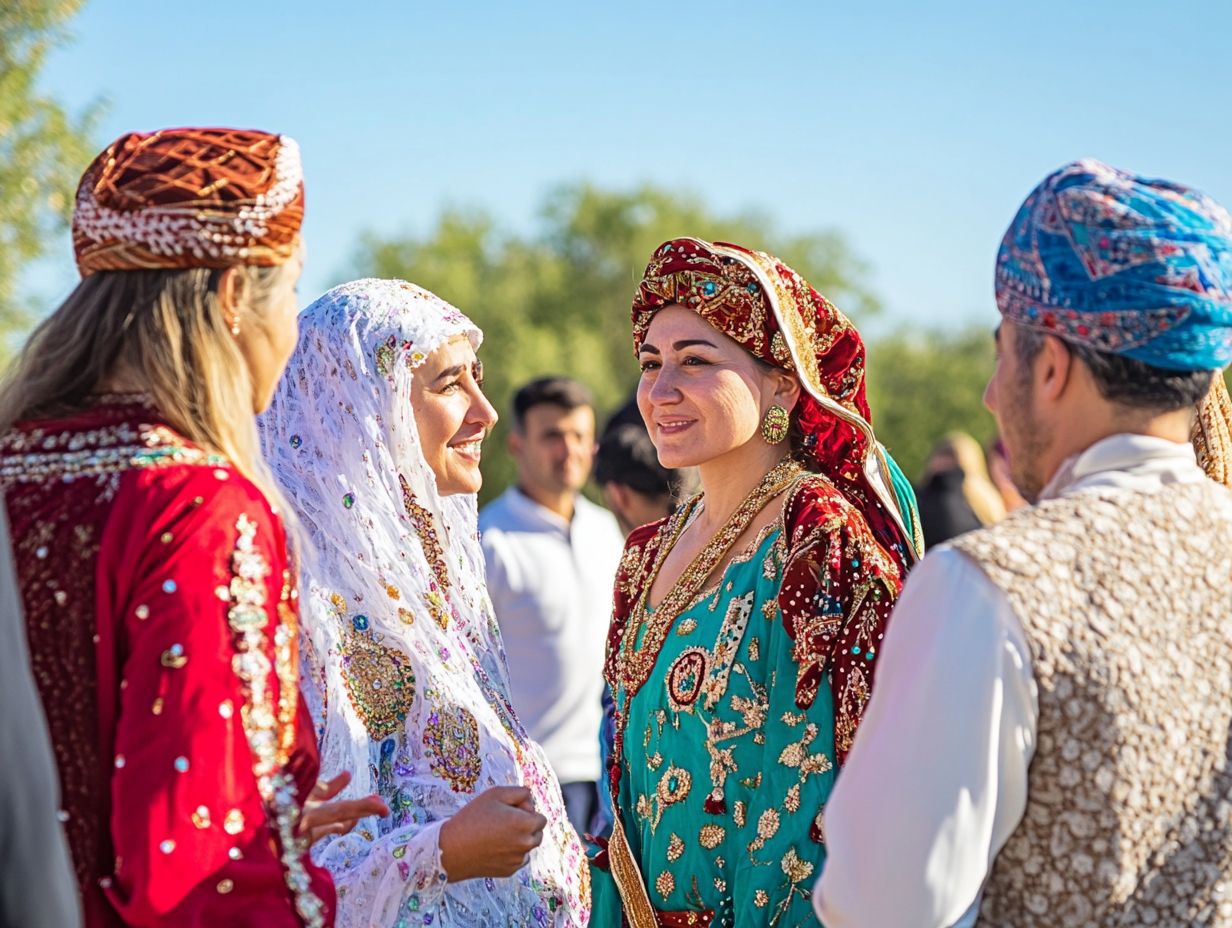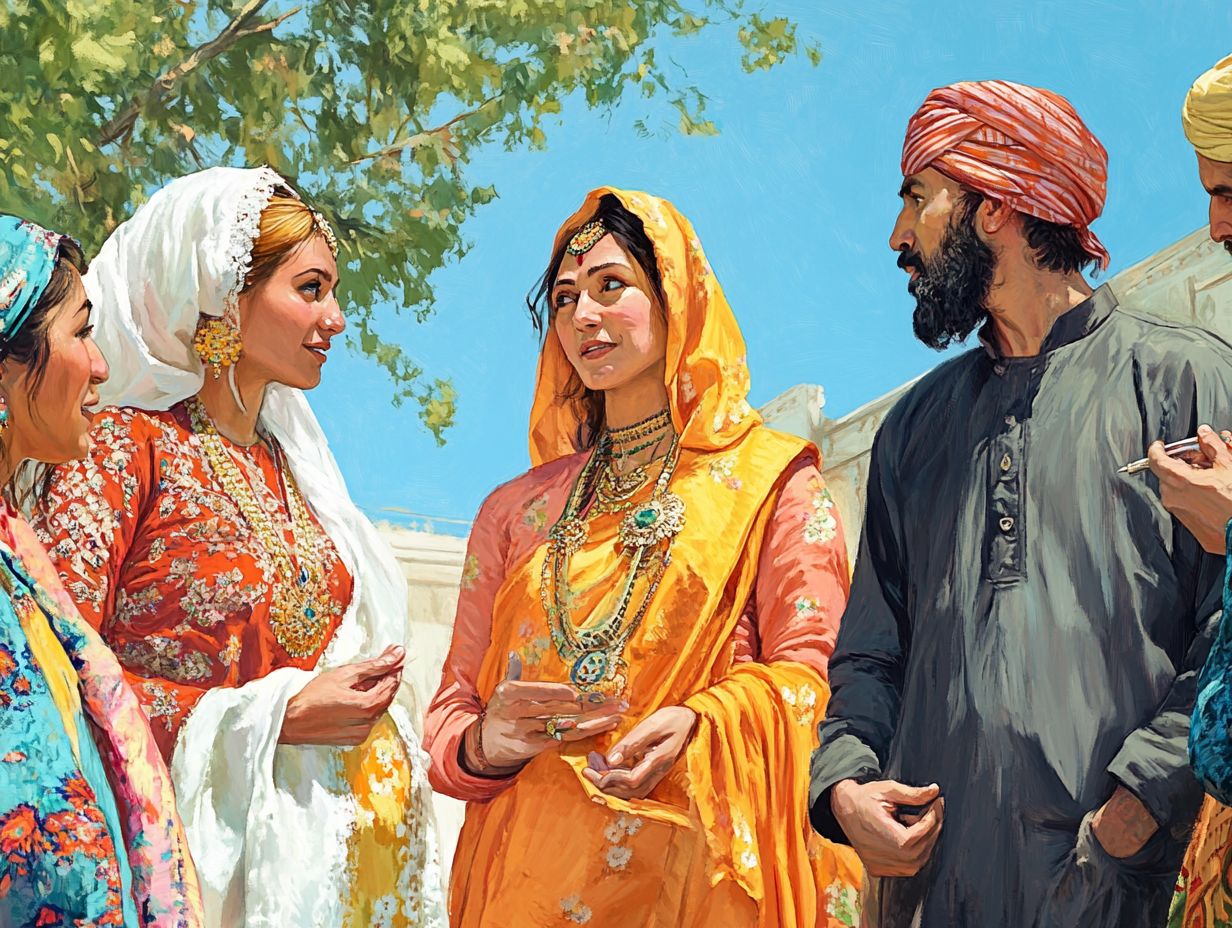Is Hinduism Banned in Uzbekistan?
Hinduism, recognized as one of the world’s oldest religions, possesses a profound cultural and spiritual legacy; however, its practice encounters significant challenges in various regions, notably in Uzbekistan, where issues of religious freedom and minority rights are prominent.
This article delves into the status of Hinduism in Uzbekistan, scrutinizing the questions surrounding its legality, the religious landscape of the nation, and the underlying reasons for any imposed restrictions, including government policy and issues of religious discrimination.
The discussion will include an analysis of the repercussions faced by practitioners of Hinduism, such as persecution and intolerance, and will explore potential avenues for promoting religious tolerance and interfaith dialogue, including legal frameworks and advocacy groups.
As the complexities surrounding Hinduism in this Central Asian nation unfold, a deeper understanding of its current state, including its socio-political context and historical relations, will emerge.
What is Hinduism?

Hinduism stands as one of the world’s oldest religions, distinguished by a profound tapestry of beliefs, rituals, and spiritual practices, including sacred texts like the Vedas and Upanishads, that have developed over millennia. This ancient faith is imbued with a rich diversity of traditions and philosophies, deeply rooted in the legacy of the Indo-Aryan civilization.
Its intricate relationship with various facets of life and community underscores its enduring significance, both in historical narratives and in contemporary society, where it influences cultural practices, festivals, and temples.
What is the Status of Hinduism in Uzbekistan?
The status of Hinduism in Uzbekistan presents a nuanced landscape, intricately tied to the nation’s historical context of religious freedom, secularism, and its current socio-political environment.
Although Uzbekistan is officially recognized as a secular state, government policies frequently favor Islam as the preeminent religion, resulting in significant challenges for minority faiths like Hinduism. Adherents of this tradition often encounter discrimination, religious persecution, and face obstacles in openly practicing their beliefs and religious rituals.
Is Hinduism Banned in Uzbekistan?
While Hinduism is not explicitly prohibited in Uzbekistan, practitioners of the faith navigate a landscape marked by significant restrictions that severely limit their ability to practice openly. This often leads to instances of persecution, anti-Hindu sentiment, and human rights violations. The legal frameworks governing religious observance create an environment where minority religions, including Hinduism, face considerable challenges in seeking recognition and protection.
These limitations stem from a complex interplay of historical, cultural, and political factors that frequently prioritize a singular national identity over the rich, pluralistic fabric of society. For Hindus in Uzbekistan, the constraints on public worship, the inability to convene freely for religious ceremonies, and the pervasive state surveillance of community activities are all too familiar. Such conditions cultivate an atmosphere of fear, alienation, and social exclusion among practitioners, complicating their efforts to preserve their traditions and cultural heritage.
Moreover, instances of harassment by authorities not only underscore the vulnerabilities faced by the Hindu minority but also illuminate the broader implications for all religious minorities within the nation. In a country grappling with fundamental questions of legal rights and human dignity, the struggles of these communities raise urgent concerns regarding the universal ideals of freedom, tolerance, and human rights within a diverse society.
What is the Religious Composition of Uzbekistan?
The religious landscape of Uzbekistan is predominantly characterized by its Muslim majority, with Sunni Islam being the faith of choice for the vast majority of the population. In contrast, minority religions, such as Hinduism, constitute a mere fraction of the overall demographic makeup. This prevailing demographic trend shapes societal attitudes toward religious minorities, including Hindus, who frequently encounter obstacles in practicing their faith and observing their religious practices.
The Islamic faith is deeply woven into the fabric of Uzbek culture, influencing not only cultural practices and community norms but also governmental policies. While Hinduism has historical roots in the region, dating back to earlier trade relations, its current representation is minimal, resulting in a distinctive dynamic within the country’s social structure and impacting the Hindu diaspora.
This underrepresentation often fosters social isolation for minority groups, as the dominant Muslim culture predominantly governs public discourse surrounding religion. Consequently, the treatment of these communities tends to mirror broader societal perceptions, which can veer toward intolerance and religious persecution, complicating the quest for acceptance and visibility faced by minority religions within a largely Muslim environment.
What are the Reasons for the Ban on Hinduism in Uzbekistan?
The perceived ban on Hinduism in Uzbekistan arises from a complex interplay of factors, intricately woven with political motivations and deep-seated religious tensions that foster discrimination against minority faiths and impact minority rights.
The government’s approach to religious practices is significantly shaped by a strong sense of nationalism and an imperative to preserve a uniform cultural identity, frequently compromising the principles of religious freedom and freedom of belief in the process.
Is it because of Political Reasons?

Political dynamics significantly shape the landscape for Hinduism in Uzbekistan, where government policies frequently reflect nationalist sentiments that prioritize the Islamic faith as a means of fostering national unity. This emphasis on a singular cultural identity often leads to discriminatory practices and religious discrimination that marginalize minority religions, such as Hinduism.
As a result, the Hindu community encounters a range of challenges, including restricted access to religious education, limited places of worship, and outright hostility in certain regions. Instances of bureaucratic obstacles when attempting to register temples or secure permits for religious gatherings further illustrate the uphill battle this minority faces. Such an environment often engenders a sense of alienation and cultural assimilation among Hindus, who find themselves navigating a societal landscape that predominantly recognizes and promotes Islamic traditions.
The implications of this situation are profound, as these political motivations not only jeopardize the survival of Hindu cultural practices but also cultivate an atmosphere of fear and uncertainty for future generations, impacting their cultural identity and traditional beliefs.
Is it because of Religious Conflicts?
Religious conflicts significantly shape the challenges faced by Hindus in Uzbekistan, where the state s firm commitment to Islam as the official religion fosters an atmosphere of intolerance toward other faiths. This dynamic cultivates an environment in which religious minorities, including Hindus, frequently encounter discrimination, religious persecution, and social exclusion.
The predominant Islamic culture profoundly influences various societal facets, from legal frameworks to cultural norms, often marginalizing those who follow different beliefs. Consequently, the everyday lives of Hindus are characterized by an undercurrent of tension as they navigate a landscape in which their traditions and practices may not only be overlooked but actively contested, impacting their freedom of expression and religious identity.
The pressures imposed by the dominant faith can engender a sense of alienation, complicating the ability of Hindus to engage openly in their religious observances. This situation also stifles interfaith dialogues, as mistrust and prejudice stemming from a lack of understanding further hinder the integration of minority religions and advocacy groups into the social fabric of Uzbekistan.
What are the Consequences of Practicing Hinduism in Uzbekistan?
Engaging in the practice of Hinduism in Uzbekistan can yield a variety of consequences for individuals within the community, marked by both legal and social repercussions arising from the restrictive environment surrounding minority religions, including issues of human rights and legal restrictions.
These challenges profoundly affect the capacity of Hindus to openly express their beliefs and partake in religious practices, including Hindu festivals and rituals, often shrouded in the fear of reprisals.
Are there Legal Consequences?
In Uzbekistan, the legal consequences for practicing Hinduism can be severe, with stringent government regulations that frequently lead to the persecution of minority faiths. Hindus may encounter fines, imprisonment, or other legal penalties for engaging in worship or rituals deemed inappropriate by the authorities. This legal framework affects their freedom of assembly and freedom of expression.
This atmosphere of surveillance and restriction profoundly impacts the Hindu community’s capacity to gather and observe traditional practices. For example, the government enforces strict registration requirements for religious groups, resulting in unregistered worship activities being treated as illegal. Consequently, many Hindus feel compelled to hold discreet gatherings, often living in fear of reprisals such as property confiscation, police raids, or other forms of state control.
Such oppressive measures pose a significant threat to their cultural identity and create a chilling effect that discourages open expressions of faith and spirituality. This, in turn, leads to a diminishing sense of community and spiritual connection among followers, profoundly affecting their ability to practice and celebrate their beliefs freely.
Are there Social Consequences?
The social consequences of practicing Hinduism in Uzbekistan often reveal themselves through discrimination and social exclusion, with Hindus frequently encountering hostility from the predominant Muslim community. This underlying tension can significantly impede their ability to engage fully in societal life, resulting in a profound sense of isolation from social networks.
Such dynamics foster a pervasive atmosphere of fear and mistrust, which complicates the participation of Hindus in local cultural and communal activities. For instance, they may struggle to secure employment, as biases rooted in their faith can negatively influence hiring decisions, leaving many to grapple with economic hardships.
Moreover, their children often face challenges in forming friendships within schools, as peers may be discouraged from engaging with those of different religious backgrounds. This situation perpetuates a cycle of marginalization, obstructing personal relationships and diminishing the potential for fostering understanding among diverse groups within the nation.
What are the Possible Solutions to the Ban on Hinduism in Uzbekistan?

Addressing the ban on Hinduism in Uzbekistan necessitates a comprehensive strategy that encompasses fostering interfaith dialogue, advocating for legal reforms, and pursuing international intervention to uphold human rights and religious liberties for minority groups.
Such measures can facilitate the establishment of a more tolerant society, where diverse beliefs are not only acknowledged but also respected.
Can there be Interfaith Dialogue?
Interfaith dialogue serves a pivotal function in addressing the challenges faced by Hindus in Uzbekistan, as it champions religious tolerance and nurtures coexistence among various cultural and ethnic groups. Through constructive communication and cultural exchange, the potential for deeper understanding and acceptance among faith communities is significantly heightened.
This initiative not only lays the groundwork for harmony but also fosters collaboration on social issues that resonate across diverse populations. Engaging both Hindu and Muslim communities in meaningful dialogues allows them to share their unique perspectives and experiences, effectively dismantling stereotypes and cultivating mutual respect.
For instance, events such as the International Day of Tolerance have witnessed local leaders unite, exemplifying successful interfaith partnerships that illuminate the shared values inherent in both religions. However, the promotion of such dialogue encounters challenges, including entrenched prejudices and historical tensions that can complicate discussions.
Surmounting these obstacles necessitates sustained effort and commitment from both communities to ensure an open and vibrant cultural exchange.
Can there be Legal Reforms?
Legal reforms are crucial for ensuring religious freedom for Hindus in Uzbekistan, as the current government policies frequently fall short in safeguarding the rights of minority religions. The advocacy for legislative changes that support religious liberty has the potential to cultivate a more inclusive environment for all faiths.
This call for reform transcends mere legal adjustments; it embodies a deeper commitment to the protection of human rights. By bringing attention to the challenges faced by Hindu communities in practicing their faith freely, advocates can rally support for the essential changes needed. Such reforms could not only enhance the circumstances for Hindus but also benefit all minority faiths in the nation.
It is through unwavering advocacy and heightened awareness that a transformation towards a more tolerant and accepting society can be realized, ultimately enriching the cultural and spiritual tapestry of Uzbekistan.
Can there be International Intervention?
International intervention holds the potential to serve as a powerful catalyst for change in Uzbekistan, offering vital support for human rights initiatives designed to safeguard the religious liberties of minority groups, such as Hindus. Through diplomatic relations and the strategic pressure exerted by global organizations, the Uzbek government can be held accountable for its treatment of religious minorities.
When international bodies, such as the United Nations or regional entities, engage in meaningful dialogue with Uzbekistan on these critical issues, they amplify the voices of marginalized communities. By fostering partnerships with local non-governmental organizations (NGOs), these international organizations can elevate awareness and mobilize essential resources to advocate for the rights of Hindus, driving policy reforms that ensure their freedom to worship without the shadow of persecution.
Such collective action not only give the power tos the Hindu community but also cultivates a more inclusive environment where diverse faiths can coexist harmoniously. The global spotlight thus plays a crucial role in dismantling stigmas, ultimately fostering a more tolerant society.
Frequently Asked Questions
Is Hinduism Banned in Uzbekistan?

No, Hinduism is not officially banned in Uzbekistan. However, it is not recognized as an official religion by the government.
What is the status of Hinduism in Uzbekistan?
Hinduism is considered a minority religion in Uzbekistan. It is estimated that less than 1% of the population identifies as Hindu.
Are Hindus allowed to practice their religion in Uzbekistan?
Yes, Hindus are allowed to practice their religion in Uzbekistan. However, they may face some restrictions and discrimination.
Are there any Hindu temples in Uzbekistan?
Yes, there are a few Hindu temples in Uzbekistan, mainly in the capital city Tashkent. However, they are not officially recognized by the government.
Has there been any documented cases of persecution against Hindus in Uzbekistan?
There have been some reported cases of discrimination and harassment against Hindus in Uzbekistan, but there is no evidence of widespread persecution.
Is there any effort to officially recognize Hinduism in Uzbekistan?
There is currently no known effort by the government to officially recognize Hinduism in Uzbekistan. However, some Hindu organizations are working towards gaining official recognition.
